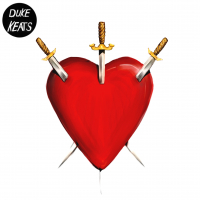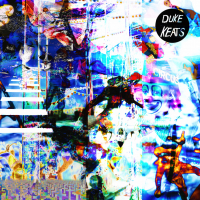"English Countryside" and "Loan Sharks" by Duke Keats
Review
It can be a discombobulating role reviewing. There I was, just preparing myself in all respects for the 17th May and his scheduled release of "Data Machinery" when with no warning whatsoever, Duke Keats drops the double header "English Countryside" and "Loan Sharks" (don't worry, the planned single will also still be out as intended & he's just hinted to me of another possible interim drop).
I suppose that we shouldn't be remotely surprised: I certainly ought not given what I've written about this uber-artist whose reputation is so solidly built on creative non-compromise. Guerilla releases are the least we should expect. However he has suggested (how seriously I'm not sure given how many people can have heard these) that "public demand" played a part.
In fact the free spirit of spontaneity seems to be behind this. John Lennon was a great advocate of writing a song & getting it out within the shortest possible turn around ("Instant Karma!" took ten days from conception to the streets and "The Ballad of John and Yoko" barely longer) and Duke has emulated him. As he told me, he's "..being a bit more carefree.." with his releases.
These are dream inspirations and though the reverie itself concerned "..English countryside, a dark forest and a boy and horse who are trying to find their way out..", as you might anticipate, furnish an artist as skilled as this one with surreal and disturbing images, factor in his penchant for the cinematic and what you get is merely the starting point.
"English Countryside" itself certainly begins with his dream but quickly takes the path marked "sinister" as "..a smoky figure coming close/Stranger danger.." is juxtaposed alarmingly with the contrasting symbol of an "English Rose". We then enter Ted Hughes territory as "..the weather claws my throat…." or the world, as Tennyson memorably put it, of "nature red in tooth and claw". Scary stuff but very poetically expressed. As one would expect.
And that's just the lyrics. The music fits them well: spooky, wispy vocals over a minimalist backing where the insistent snare drumming (I admit that it reminded me of the "ghost drummer boy" stories) dominates over the icy synths (great arranging: had it been the other way round, it would have been far too close to many another spooky synth track).
The second half of the diptych, "Loan Sharks" goes into more personal territory (although given the fluidity of his writing, that's my assumption only) with the subject being an emotional parasite of some description.
Louder than its companion, it's still a fairly skeletal arrangement with another detached vocal seemingly beamed in from the next county. Alienation again seems a key theme and boy does Duke seem weary on this cut. Tired of someone's antics and possibly stated "more in sorrow than anger".
If "English Countryside" was him writing a sonic screenplay to set outdoors, then "Loan Sharks" moves the action inside and quite possibly swaps the widescreen scope for something not just more intimate but compressed and suffocating.
I've only heard these songs myself this afternoon and could be well wide of any mark I might have discerned: so over to you. Even if I'd played them a dozen times each, such are the intricacies of Duke Keats' music that a range of listeners could easily draw a corresponding wide range of responses, all of them plausible. He's that sort of writer.
I am still looking forwards to "Data Machinery" in just over a fortnight's time but I'm also keeping myself ready for the possible "second part" to today's duo that he has hinted at: presumably in the meantime.










